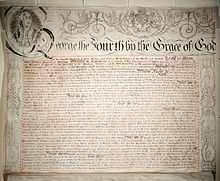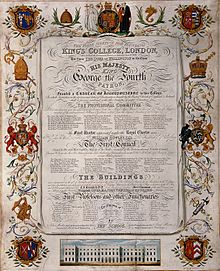
Back Cynelicu bōc ANG امتياز ملكي Arabic Royal charter Catalan Siarter brenhinol Welsh Royal charter Danish Royal Charter German Reĝa ĉarto Esperanto Carta Real Spanish Royal Charter Basque منشور سلطنتی Persian


| Part of the Politics series |
| Monarchy |
|---|
 |
|
|
A royal charter is a formal grant issued by a monarch under royal prerogative as letters patent. Historically, they have been used to promulgate public laws, the most famous example being the English Magna Carta (great charter) of 1215, but since the 14th century have only been used in place of private acts to grant a right or power to an individual or a body corporate.[1][2][3] They were, and are still, used to establish significant organisations such as boroughs (with municipal charters), universities and learned societies.
Charters should be distinguished from royal warrants of appointment, grants of arms and other forms of letters patent, such as those granting an organisation the right to use the word "royal" in their name or granting city status, which do not have legislative effect.[4][5][6][7] The British monarchy has issued over 1,000 royal charters.[5] Of these about 750 remain in existence.
The earliest charter recorded on the UK government's list was granted to the University of Cambridge by Henry III of England in 1231,[8] although older charters are known to have existed including to the Worshipful Company of Weavers in England in 1150[9] and to the town of Tain in Scotland in 1066.[10] Charters continue to be issued by the British Crown, a recent example being that awarded to the Chartered Institute of Legal Executives (CILEX), and the Chartered Institute of Ergonomics and Human Factors, in 2014.[11]
- ^ "Charter". The Supplement to the Penny Cyclopaedia of the Society for the Diffusion of Useful Knowledge. Vol. 1. Society for the Diffusion of Useful Knowledge. 1845. pp. 331–332.
- ^ "Magna Carta 1215". British Library. Retrieved 3 February 2019.
- ^ Peter Crooks (July 2015). "Exporting Magna Carta: exclusionary liberties in Ireland and the world". History Ireland. 23 (4).
- ^ "Granting arms". College of Arms. Retrieved 3 February 2019.
- ^ a b "Royal Charters". Privy Council. Retrieved 31 December 2023.
- ^ "Guidance: Applications for Protected Royal Titles" (PDF). royal.uk. Archived (PDF) from the original on 4 May 2017. Retrieved 3 February 2019.
- ^ "Chelmsford to receive Letters Patent granting city status". BBC News. 6 June 2012.
- ^ "List of chartered bodies". Privy Council. Retrieved 30 January 2019.
- ^ "Guide to the Worshipful Company of Weavers Charter 1707". University of Chicago. Retrieved 30 January 2019.
- ^ "History and Heritage". Visit Tain. Archived from the original on 30 January 2019. Retrieved 30 January 2019.
- ^ "CIEHF Documents". The Chartered Institute of Ergonomics and Human Factors. Retrieved 3 February 2019.
© MMXXIII Rich X Search. We shall prevail. All rights reserved. Rich X Search